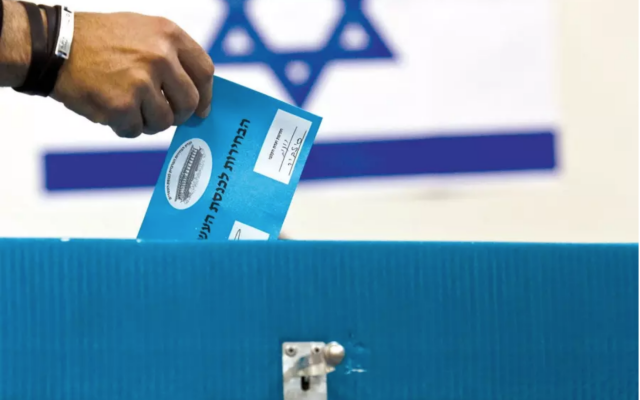September Elections in Israel: All About the Math
Just about five months since Israelis went to the polls, they are heading back to voting booths Sept. 17 in what the country’s media are calling a “do-over” election.
Just about five months since Israelis went to the polls to choose their legislature and prime minister, they are heading back to voting booths Sept. 17 in what the country’s media are calling a “do-over” election. That’s because Prime Minister Benjamin Netanyahu, who was tasked with putting together a coalition government after the April election, was unable to do so. He needed at least 61 of the 120 Knesset members, and he only had 60.
It is unclear whether, even if the prime minister’s Likud party gains a majority of the seats, this election outcome will be any different. And that spells trouble for the political stability of the country.
The September election is already making history. There have never been two national elections in one year. It is predicted that more historical records could be broken next month.
Israeli voters will choose from 32 parties for which they will cast a vote. That is down from the record 47 parties that were registered for the April vote. No single party in Israeli history has won an outright majority. Instead, like-minded, or similar-minded parties join together to form a coalition government.
There is also talk this time around of a unity government. Avigdor Lieberman, leader of the ultra-nationalist party Yisrael Beiteinu, is the politician who cannily and one-handedly stopped Netanyahu from creating a coalition after the April election. Lieberman is saying that he wants a unity government between Likud and the center-party Blue and White, which formed out of a merger of smaller parties. In April’s vote, those two parties both received 35 votes. Polls of likely voters indicate the two parties will come out on top in September, with about 30 seats each. So that may still not result in a coalition government without another party joining.
According to Atlanta native Rachel Broyde, who is the foreign spokesperson for Likud’s campaign in Israel, the party is not interested in a unity government.
“If early polls are to be trusted, and that is a big ‘if,’ it is looking once again like, barring a national unity government made up primarily of Blue and White with Likud, that Lieberman and his Yisrael Beiteinu party will be in the role of kingmaker,” suggested Richard Walter, vice president of Curriculum and Outreach at the Center for Israel Education.

“Will Lieberman be willing to endorse [Blue and White leaders] Benny Gantz and Yair Lapid as prime minister? Will Likud tap another person if Netanyahu is unable to put together a coalition? Would Blue and White join a government with Netanyahu? The answers to these questions will be the key to seeing if things play out differently,” Walter told the AJT.
“One thing to watch is how much of a bump Lieberman will get for his refusal to acquiesce to the religious parties in May. If he is able to win more than the five seats he got in the spring, that will put him in an even stronger position to demand what he wants for himself and his party from any potential government.”
In any case, there may be fewer parties from which to choose and include in a coalition government. In fact, there may be only nine parties – which would be a historic low – that will meet the threshold to even make it into the Knesset. One reason there may be fewer parties able to receive the required 3.25 percent of the votes to qualify is that several have merged, on the right and on the left, into larger parties.
The United Right Party is an alliance of the New Right and the Union of Right-Wing Parties, most of whose members are religious. Yet, the party is now headed by former Justice Minister Ayelet Shaked, who is secular.
Also on the right, and expected to capture about the same number of seats it won in April, are the ultra-religious parties, Shas and United Torah Judaism, both supporters of Netanyahu.
The party that led the country for its first nearly 30 years, Labor, joined an alliance with Gesher, a more right-wing party that focuses on social and economic issues. To make things more interesting, Gesher’s head, Orly Levy-Abekasis, used to be a member of Lieberman’s Yisrael Beiteinu Party. Also on the left, former Prime Minister Ehud Barak – formerly a head of Labor – launched a new party and enlisted the leftist Meretz party as well as a young, popular former Laborite, Stav Shaffir, to form the Democratic Union party.
In the 2015 elections, the Arab parties formed an alliance that resulted in it becoming the third largest party in the Knesset, with 13 seats. In the April elections, the alliance split, discouraging many Israeli Arabs from even voting, and resulting in only 10 Arab representatives in the Knesset. This time around, the parties again united, but it’s unclear whether this will propel Arab citizens to come out and vote.
In general, there’s a fear of election fatigue for all Israeli voters, resulting in an overall lower turnout. One motivator that has existed at least since the 2015 elections is a desire among many Israelis to crown a new prime minister. Last month, Netanyahu surpassed founding Prime Minister David Ben-Gurion as the longest-sitting prime minister. Unlike the 2015 election, though, Netanyahu is under the shadow of impending indictments.

The Israeli attorney general has already announced his intention to indict the prime minister on bribery and other corruption charges in three different cases, pending a hearing in which he and his attorneys can argue their case. That hearing is scheduled for Oct. 2-3, just weeks after the September election.
Some party leaders, including those of Blue and White, have indicated they wouldn’t sit in a coalition with an indicted prime minister. If he were to step aside for another Likud leader, however, Blue and White might join a government with Likud. Netanyahu is obviously under a lot of pressure. That is why 39 of Likud’s top candidates last weekend signed a petition stating, according to Broyde, that “only Prime Minister Netanyahu will serve as prime minister, and no other Likud member, regardless of the upcoming elections.”
So, will Netanyahu be able to patch together a government after these next elections?
“It’s all about the math,” summed up Walter. He indicated that the maneuverings on each side of the political spectrum could “lead to a different landscape than in April.” Or, “we may be back where we started in the spring.”




comments